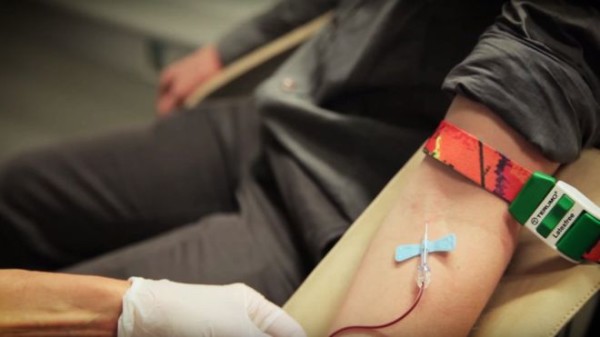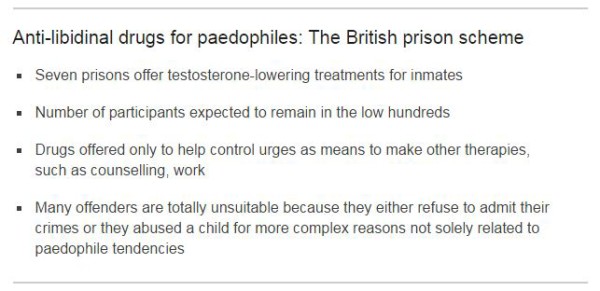Can you stop a paedophile before they’ve abused a child?
April 14, 2016 · By Dominic Casciani for www.bbc.com

Could chemical castration be used to prevent child abuse?
Can you stop a paedophile before they’ve abused a child?
That’s the aim of a unique clinical trial in Sweden that aims to intervene in the lives of potential abusers. And it’s a trial that raises ethical and legal questions about whether societies can come up with therapies for the most dangerous offenders before they have broken the law.
The trial at the Karolinska Institute, one of the world’s leading medical universities, will recruit up to 60 potential sex offenders before they have broken the law.
The team, led by Dr Christoffer Rahm, will then investigate whether they can use a medicine to reduce the risk of the individual committing child abuse.
“Up until now most of the attention has been on how to deal with perpetrators [once detected] by the police or by the authorities, but by this stage children have already been harmed,” says Dr Rahm.
“I want to shift focus and explore methods of preventing child sex abuse from happening in the first place.”
Drug treatments for sex offenders, popularly known as chemical castration, aren’t new. There are a string of countries where men can have medication imposed upon them to crush their sex drive.
But nobody knows whether such treatments can be used to prevent abuse in the first place.

The Karolinska Institute in Stockholm will recruit potential sex offenders before they break the law
And that’s where Dr Rahm’s programme, which is seeking crowdfunding support, seeks to come in.
Over the course of two years, the 60 volunteers will be split into two groups. One will receive a drug that is known to rapidly and dramatically reduce levels of testosterone. The other will receive a placebo. Neither the researcher team nor the volunteers will know who is getting the medicine. This convoluted approach is the gold standard for clinical trials because nobody knows who is taking what until the end, meaning no-one can game the results and conclusions can’t be prejudiced by assumptions.
So, in theory, the researchers could come closer to establishing which types of offenders genuinely benefit in the long-term from having chemical castration-style drugs as part of therapy.
So how exactly are they recruiting these volunteers and how will they measure success?
Here in the UK, seven prisons give anti-libidinal drugs to paedophiles as part of a wider package designed to address offending.
But forensic psychiatrist Professor Donald Grubin of the University of Newcastle Upon Tyne, a government consultant, says anyone on the cusp of offending is in a different situation altogether.
“The problem has been getting psychiatrists on board to treat [potential offenders],” he says.
“If you go to a GP, they will struggle to find someone to refer you on to.”

April Jones was abducted and murdered in October 2012 by a man who had previously downloaded abuse images
One British organisation that offers therapeutic help to “non-offending” paedophiles has recently received the backing of Paul Jones whose five-year-old daughter April was murdered by a man who had previously downloaded abuse images.
In Sweden, things are different. The Karolinksa Institute operates a national helpline for potential offenders called Preventell. It will introduce volunteers to the clinical trial.
Once inside the trial, the treatment group will receive a drug called Degarelix which, says Dr Rahm, leaves 97% of men who receive it with no detectable testosterone within three days.
And that raises two important ethical questions – why shouldn’t all the volunteers receive the drug and, even more importantly, what happens if the trial comes across evidence that some men fail to respond and children are being exposed to risks?

For those of us in the non-scientific world, it may seem odd to deny someone a drug that could help.
But the ethical argument goes that the participants on placebos are in no worse position than before they agreed to take part – they have not committed an offence and, therefore, would not be able to receive treatment in the first place.
As for the risk of offending, the research team will look for signs of changes in the minds of their subjects. They will test for lower sexual arousal, less impulsiveness (such as testosterone-fuelled lack of self-control) and they will also measure empathy towards potential victims.
Each volunteer will undergo brain scans that will document their reactions to computer-generated pictures resembling adults and children in swimming costumes or underwear.
Finally, Dr Rahm says the research includes carefully-constructed questions to uncover whether any of the men are at risk of abusing children at the outset of and during the trial.
Whatever the results of this Swedish trial, Professor Grubin says society needs to grasp bigger legal and ethical questions over how to offer prevention without scaring off those who need the help.
“The problem is confidentiality,” he says.
“If someone says they want help [by downloading abuse images] and the doctor has to report them to the police, then they are not going to come forward.”






